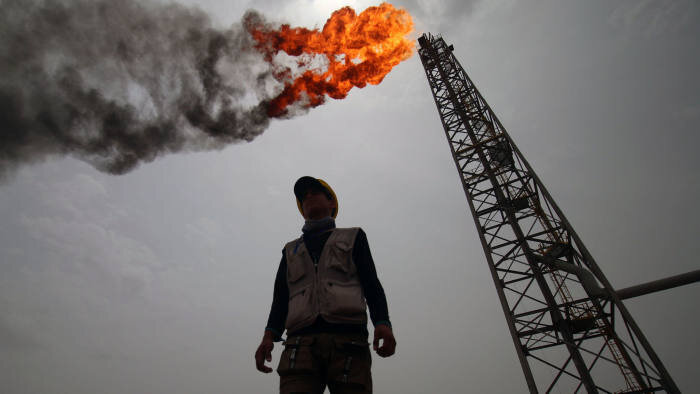
An oil-free economy: from words to deeds

Even though, those other sectors would have helped the country in the current situation in which under the U.S. sanctions Iran’s oil revenues have shrunk considerably.
Despite all these years of negligence, it seems that since the re-imposition of the U.S. sanctions, the government has started to feel the need for departing from its oil-dependent economy toward an “oil-free” one more strongly than before, as the Leader of the Islamic Revolution has constantly underlined the need for decreasing the economic reliance on oil in order to reduce the impact of the U.S. interruptions.
Earlier this month, the Leader urged the government to cut the country’s economic dependence on oil and change the U.S. pressures into opportunities for the growth of the country.
“If the officials act wisely, threats could become opportunities. Sanctions could save the country's economy from dependence on oil, which is the major cause of many [economic] problems,” Ayatollah Ali Khamenei told a number of Air Force officers on the occasion of Air Force Day on February 8.
When talking about Iran as a country with an oil-free economy, numerous questions come to mind, “Is it really possible for the country to completely cut reliance on oil revenues?” “Having oil is a good thing or a bad one?” “What are the disadvantages of an oil-dependent economy?” and finally and more importantly: “How to realize the goal of becoming an oil-free economy?”
Unfortunately, Iran’s economy, for long, has been heavily dependent on oil and even after the Islamic revolution, the governments haven’t done much to alleviate the negative impacts of such an economic system.
Years after years, the country’s budget plans have been prepared solely based on oil revenues and other areas like the private sector, exports, and domestic production which are the driving force behind many of the world’s leading economies were neglected and stood weak and immature.
Whenever the oil revenues have increased, the logic and approach of the governments regarding the allocation of resources have also completely changed and gotten far from the basic economic principles.
So, this begs the question that: “Has, even for once, the mindsets of the country’s decision-makers been independent of the oil revenues?” and the answer, unfortunately, is clearly “No”!
The past vs. the new horizons
When speaking about the Iranian economy, analysts and experts generally agree on one central point, and that is the fact that in the country, oil revenues haven’t been used in the best possible way.
But where does the problem lay? And what should be done now to reverse this broken cycle and, as the Leader urges, “cut the cord” of reliance on oil and become an oil-free economy?
As mentioned earlier, since the re-imposition of the U.S. sanctions and with the Leader personally emphasizing the need for reducing reliance on oil, the government, in the past few years, has been following serious programs in this regard.
This time everything seems to be different and the country seems to be seriously determined to “cut the cord”.
For instance, some good measures have been taken for supporting the country’s private sector and that would be the best answer to all the problems emerging from the reliance on oil.
In this regard, new rules and regulations have been provided to pave the way for the strong presence of the private sector in the country’s economy. The law on improving the business environment, the formation of a dialogue council, the law on protection and promotion of domestic production and etc. are among these regulations.
The country’s industry, mining, and trade ministry has also been pursuing serious programs in this regard and has taken many practical steps for supporting the private sector and domestic production.
Although quite impressive, the mentioned efforts are not still enough. In the current economic situation and with the oil revenues at record low, the private sector is obviously facing some problems in supplying their raw materials, machinery and spare parts, so in this regard, the government should put great importance on providing incentives and faculties for investors to encourage them to join hands with the government in its movement for supporting the private sector.
Final thoughts
Despite a not-very-successful experience in separation from the oil in the past, Iran seems to be finally determined to take a serious action in this regard, and as the Leader put it “The threat of the U.S. sanctions” is finally becoming an “opportunity” for breaking free of oil and is pushing the Iranian government to come out of its comfort zone and see beyond the illusion of an “oil-rich economy”.
Hopefully, this movement which has been a much-needed step for the country will continue even after the U.S. sanctions are removed and even in the case that Iran would be able to sell its oil once again.
Supporting and backing the private sector is the one proven way of establishing a strong economy that would not be shaken easily by any sanctions.


Gold price edges up as market awaits Fed minutes, Powell speech

Glencore trader who led ill-fated battery recycling push to exit

Emirates Global Aluminium unit to exit Guinea after mine seized

UBS lifts 2026 gold forecasts on US macro risks

Iron ore price dips on China blast furnace cuts, US trade restrictions

Roshel, Swebor partner to produce ballistic-grade steel in Canada

US hikes steel, aluminum tariffs on imported wind turbines, cranes, railcars

EverMetal launches US-based critical metals recycling platform

Afghanistan says China seeks its participation in Belt and Road Initiative

First Quantum drops plan to sell stakes in Zambia copper mines

Ivanhoe advances Kamoa dewatering plan, plans forecasts

Texas factory gives Chinese copper firm an edge in tariff war

Pan American locks in $2.1B takeover of MAG Silver

Iron ore prices hit one-week high after fatal incident halts Rio Tinto’s Simandou project

US adds copper, potash, silicon in critical minerals list shake-up

Barrick’s Reko Diq in line for $410M ADB backing

Gold price gains 1% as Powell gives dovish signal

Electra converts debt, launches $30M raise to jumpstart stalled cobalt refinery

Gold boom drives rising costs for Aussie producers

First Quantum drops plan to sell stakes in Zambia copper mines

Ivanhoe advances Kamoa dewatering plan, plans forecasts

Texas factory gives Chinese copper firm an edge in tariff war

Pan American locks in $2.1B takeover of MAG Silver

Iron ore prices hit one-week high after fatal incident halts Rio Tinto’s Simandou project

US adds copper, potash, silicon in critical minerals list shake-up

Barrick’s Reko Diq in line for $410M ADB backing

Gold price gains 1% as Powell gives dovish signal

Electra converts debt, launches $30M raise to jumpstart stalled cobalt refinery

















